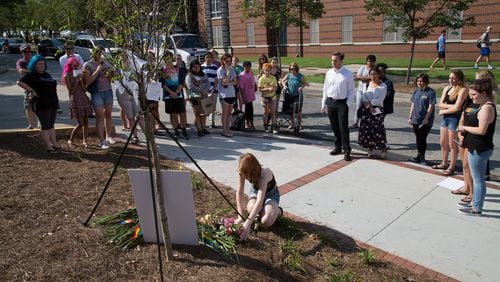Michelle Williamson remembers her first trip to Georgia Tech in 2015 to get help for her son, a charismatic young man who suddenly shared disturbing tales that sounded like paranoia.
He thought classmates were purposely giving him wrong answers in study groups. He believed people were videotaping his every move. He suspected his mother was part of a conspiracy to made him quit school when she talked to him about transferring.
The stress of excelling at one of the most rigorous schools in the nation was overwhelming.
“There was a lot of academic-based pressure,” her son said in a telephone interview with The Atlanta Journal-Constitution. “It’s a really tough school.”
He sought help on campus twice, but the counselor suggested he needed additional services off campus. The AJC is not identifying the student at his family’s request.
“What are they there for?” said Williamson’s son, who graduated in August. “They need to have people educated in mental health to help students.”
Georgia Tech’s efforts to help students dealing with stress, anxiety, depression and other issues is under scrutiny again after two students died in recent weeks in apparent suicides. One hung himself in a restroom and the other died from gas asphyxiation, according to campus police reports. Those deaths come a year after a student who sought counseling was killed in an apparent suicide-by-cop on campus.
Georgia Tech suggests it’s doing more to help students; but many students, faculty and parents say it’s not enough.
Some students and faculty started a petition demanding Tech hire more counselors, eliminate fees for psychiatric appointments and enforce reasonable expectations by faculty for coursework. More than 500 people had signed the petition by the middle of last week, with many describing their own struggles with stress and what they said has been inaction by campus administrators. The petition says prior campus town hall meetings and task forces are attempts to “obfuscate” and “affected very little change in the face of our growing anguish.”
Tech’s president, G.P. “Bud” Peterson responded to the deaths, in part, with a campuswide effort one day this month called “Open Door Day,” encouraging faculty and staff to be available to talk with students who are feeling the pressures of finals or other personal challenges.
Campus administrators declined a request for an interview but sent the AJC a list of ongoing efforts to address mental health issues, such as: construction of a new Mental Health Intake Center that will begin over winter break, more training to identify and help students, and partnering with a company to enhance after-hours mental health support. Tech announced last week it’s adding three therapists, months ahead of schedule.
Georgia Tech has also increased spending on mental health from $3.3 million last fiscal year to $4.2 million this fiscal year.
Student anxiety and stress are not unique to Georgia Tech. Four Northwestern University students committed suicide this year, the Chicago Tribune recently reported. Fourteen University of Pennsylvania students committed suicide between 2013 and 2017, the Daily Pennsylvanian, its student newspaper, reported. Nationally, the suicide rate increased by 3.7 percent in 2017, according to federal data.
The percentage of students seeking counseling on U.S. college campuses increased more than 30 percent during a recent five-year stretch, according to the Center for Collegiate Mental Health at Penn State University. Georgia Tech has seen a 43 percent increase in new requests for counseling between the 2013-14 school year and 2017-18.
Some public universities, such as Georgia State and the University of Georgia, have smartphone apps that help students seek emergency mental health services. The University System of Georgia has a program that offers assistance to campuses during a crisis.
Georgia Tech does not keep data on suicides and is not required to do so. Other statistics, though, show it’s an ongoing problem. The percentage of Tech students who have said they considered suicide increased from about 6 percent in 2014 to 9.5 percent last year, according to a staff report. Nearly 90 percent of Georgia Tech students reported they were “very stressed” in a 2011 survey, compared to the national rate of 53 percent.
Georgia Tech students can get two hours of time with a psychiatrist each school year. For a new patient that would typically be a one hour initial intake visit and two follow up visits. For an established patient, it would be four follow up visits.
A student can see a counselor immediately if the problem is considered severe, but the average wait time for a session is about nine days, officials say. That’s not quick enough, some students say.
Third-year student Collin Spencer said many students seek counseling when they’re in crisis and can’t wait for a week or two. Spencer, who said he dealt with PTSD from a traumatic event before coming to college. He sought counseling as a first-year student and decided to help others. He’s director of Tech’s Student Mental Health Coalition.
Spencer said Georgia Tech is hesitant to partner with other organizations to provide more comprehensive services to students. It also needs an administrator to take charge of the issue.
“Georgia Tech is in a crisis,” Spencer said.
Many students say embracing stress, and celebrating it, is as much a part of the Georgia Tech experience as the campus whistle that blows to signify the end of classes.
But, campus leaders wrote in one report to Tech administrators, “There is an unhealthy competition among students and faculty.”
That pressure has often led to suicide attempts.
Tech officials acknowledged the academic pressures during a meeting earlier this semester. Recommendations have included tweaking the grading system, revamping classes for first-year students and making sure graduate students don’t feel isolated.
“This is going to take some cultural change … There are some things that will take more time than we’d like,” Colin Potts, vice provost for undergraduate education, told the audience during that meeting.
Tech administrators say they’re making progress in other areas to improve student well-being. They’ve implemented a program to encourage students to get more rest and improve time management, improved the student referral system and created a self-help wellness app. Tech said it has also reduced the student-to-“professional counselor” ratio of 1,000-to-1, a target announced last year. It had been as high as nearly 1,600-to-1.
Williamson’s son graduated in August and said he’s doing somewhat better. The family would like to see more support groups for students, increased follow-up by counselors and more teaching assistants.
“We’ve got to find out why this is happening and do something about it,” she said.
BY THE NUMBERS
9.5 - the percentage of Georgia Tech students who considered suicide in 2017
19 - the number of professional counseling positions at Georgia Tech
505 - how many people signed a petition demanding better mental health services at Georgia Tech as of mid-last week
1,689 - the number of new students seeking mental health services during the 2017-18 academic year
11,050 - how many hours of counseling were done in 2017-18
$4.2 million - how much money Georgia Tech is spending on mental health services this fiscal year
Sources: Georgia Tech, Young Democratic Socialists of America.
About the Author







